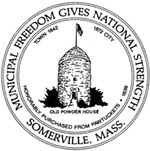 Veterans have sacrificed for community and country, but can face challenges when they return home from duty. Somerville’s commitment to honoring their sacrifice will intensify as the city joins the challenge issued by the Obama Administration to end veteran homelessness by 2016, Mayor Joseph A. Curtatone announced today.
Veterans have sacrificed for community and country, but can face challenges when they return home from duty. Somerville’s commitment to honoring their sacrifice will intensify as the city joins the challenge issued by the Obama Administration to end veteran homelessness by 2016, Mayor Joseph A. Curtatone announced today.
In joining the Mayors Challenge to End Veterans Homelessness, Somerville reaffirms its commitment to veterans and making sure they receive the support they need and deserve, starting with a roof over their heads. The Somerville-Arlington Continuum of Care—a collaborative planning group of local providers that coordinates housing and services for homeless families and individuals—recently met with officials from the State, U.S. Department of Housing and Urban Development, and the Bedford Veterans Affairs Medical Center about the Massachusetts plan to end homelessness among veterans.
The Continuum of Care will notify the City’s Veterans Services Department when a veteran enters a shelter or seeks assistance, or otherwise comes into contact with any of the agencies, in addition to ongoing efforts to end homelessness among veterans as a standard topic of discussion at its regular monthly meetings. Also, the Continuum will dedicate one meeting annually specifically to ending homelessness among veterans, in coordination with city Director of Veterans Services Jay Weaver, with those annual meetings focusing on evaluating progress over the prior year and strategizing efforts for the future. The Veterans Services Department currently has a close working relationship with the Somerville Police Department, and police officers notify Veterans Services if they ever encounter a homeless veteran on the street.
Last August, the Massachusetts Bay Veterans’ Center opened in Somerville with 22 transitional and seven permanent housing units—all affordable—for veterans in need of supportive housing. The Center, built by the Volunteers of America, was funded in part by the city through $250,000 in federal HOME Investment Partnerships Program funds and $150,000 from the City’s Affordable Housing Trust Fund.
Somerville’s most recent homeless count held on the night of January 29, 2014, found that there was one homeless veteran in emergency shelter and 14 in transitional housing. While Somerville has a low homeless veterans population, Mayor Curtatone believes that one homeless veteran is one too many.
“Somerville’s orienting value—creating a community that is an exceptional place to live, work, play and raise a family—is an empty promise unless it is extended to every resident, no matter their station in life or the challenges they face.That value takes on special meaning for those who have served this community in the military,” said Mayor Curtatone. “We know that, despite their sacrifices on our behalf, veterans remain disproportionately vulnerable to unemployment, homelessness and ongoing health and medical problems. The rates of homelessness among veterans have traditionally been much higher than the general population.That trend is starting to slow, but slowing it down isn’t enough. We can and must do more to ensure that our veterans can come home to a safe and healthy environment, with access to resources to help them succeed here at home, and that starts with ensuring that not a single veteran in Somerville is left homeless.”
The Mayors Challenge to End Veterans Homelessness is a call to action by the U.S. Department of Housing and Urban Development, Veterans Affairs, the U.S. Interagency Council on Homelessness, and the National League of Cities. It includes four key strategies:
- Housing First: Providing homeless veterans with housing as quickly as possible, and then providing services as needed.
- Targeting of Permanent Supportive Housing: Providing permanent housing and supportive services to chronically homeless veterans and their families.
- Rapid Re-Housing Opportunities: For homeless veterans who do not need supportive services, rapid re-housing helps veterans who are homeless or at risk of homelessness end their housing crisis and stabilize in housing.
- Community Resources: Because not every veteran is eligible for VA health care services or has access to housing and services programs, community resources such as the Somerville-Arlington Continuum of Care can focus on dedicating their housing units and resources to ensure that every veteran who is homeless or at risk of becoming homeless receives the support they need.















Reader Comments